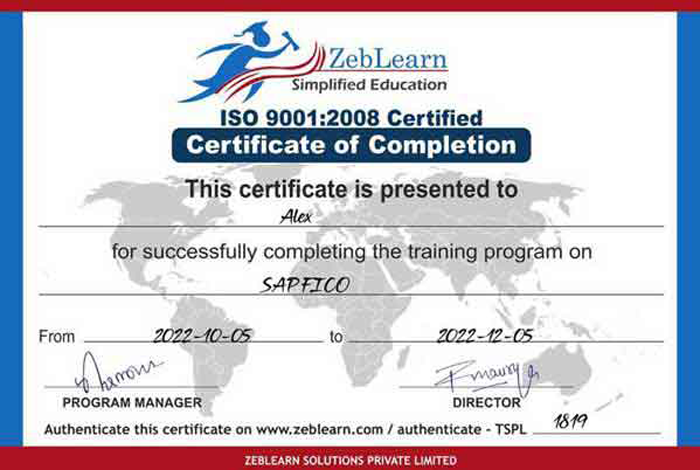
Certainly! Here are the answers to the top 50 SAP SRM (Supplier Relationship Management) interview questions:
- What is SAP SRM?
SAP SRM (Supplier Relationship Management) is a module in SAP ERP that helps organizations manage their procurement processes and collaborate with suppliers for efficient procurement and supply chain management. - What are the key components of SAP SRM?
The key components of SAP SRM include Supplier Self-Service (SUS), Catalog Management, Contract Management, Sourcing, and Purchase Order Management. - What is the purpose of the Supplier Self-Service (SUS) component in SAP SRM?
The Supplier Self-Service (SUS) component in SAP SRM enables suppliers to access and interact with procurement-related information, such as purchase orders, invoices, and payment status. It helps in streamlining supplier collaboration and self-service capabilities. - What is the purpose of the Catalog Management component in SAP SRM?
The Catalog Management component in SAP SRM allows organizations to manage catalogs of goods and services offered by suppliers. It helps in standardizing and streamlining procurement processes by providing a centralized catalog repository. - What is the purpose of the Contract Management component in SAP SRM?
The Contract Management component in SAP SRM helps organizations manage procurement contracts, including creation, negotiation, and monitoring of contract terms and conditions. It enables efficient contract lifecycle management. - How does SAP SRM handle supplier collaboration and communication?
SAP SRM provides tools and features for supplier collaboration and communication, such as supplier portals, collaboration workspaces, and document sharing. It enables real-time collaboration and improves communication with suppliers. - What is the purpose of the Sourcing component in SAP SRM?
The Sourcing component in SAP SRM is used to manage the sourcing process, including supplier selection, RFx creation, bidding, and evaluation. It helps in optimizing supplier evaluation and negotiation. - How does SAP SRM handle purchase order management?
SAP SRM allows organizations to create, manage, and track purchase orders for procurement activities. It includes features for order creation, approval workflows, order tracking, and order confirmation. - What is the role of SAP SRM in strategic sourcing?
SAP SRM supports strategic sourcing by providing tools and processes for supplier evaluation, negotiation, and contract management. It helps organizations optimize sourcing decisions and drive cost savings. - How does SAP SRM integrate with other SAP modules?
SAP SRM integrates with various other SAP modules, such as Materials Management (MM), Finance and Controlling (FI/CO), and Enterprise Resource Planning (ERP), to ensure seamless data exchange and process integration across different functions. - What is the purpose of the Supplier Evaluation in SAP SRM?
The Supplier Evaluation in SAP SRM is used to assess and measure the performance of suppliers based on predefined criteria, such as quality, delivery, and service. It helps in supplier performance management and decision-making. - How does SAP SRM handle procurement process automation?
SAP SRM provides functionality for automating procurement processes, such as purchase requisition creation, approval workflows, supplier selection, and purchase order creation. It helps in reducing manual intervention and streamlining procurement activities. - What is the purpose of the Supplier Collaboration Workspace in SAP SRM?
The Supplier Collaboration Workspace in SAP SRM provides a collaborative platform for buyers and suppliers to interact, share documents, and collaborate on procurement-related activities. It helps in improving supplier collaboration and communication. - How does SAP SRM handle contract lifecycle management?
SAP SRM supports end-to-end contract lifecycle management, including contract creation, negotiation, approval, monitoring, and expiration. It provides features for contract authoring, version control, and contract performance tracking. - What is the purpose of the Supplier Registration in SAP SRM?
The Supplier Registration in SAP SRM is used to manage the onboarding process for suppliers. It includes features for supplier registration, qualification, and documentation. It helps in streamlining supplier onboarding and compliance. - How does SAP SRM handle procurement analytics and reporting?
SAP SRM provides reporting and analytics capabilities for procurement-related data. It includes predefined reports, key performance indicators (KPIs), and dashboards for monitoring procurement performance and analyzing spend data. - What is the role of SAP SRM in strategic sourcing and category management?
SAP SRM supports strategic sourcing and category management by providing tools for supplier evaluation, category planning, sourcing events, and contract management. It helps organizations optimize sourcing strategies and category performance. - How does SAP SRM handle integration with external procurement systems?
SAP SRM supports integration with external procurement systems through various integration mechanisms, such as web services, XML interfaces, or EDI (Electronic Data Interchange). It enables seamless data exchange with external systems. - What is the purpose of the Central Contract Management in SAP SRM?
The Central Contract Management in SAP SRM provides a central repository for managing procurement contracts across multiple systems and organizations. It helps in consolidating and harmonizing contract management processes. - How does SAP SRM handle supplier performance monitoring and evaluation?
SAP SRM enables organizations to monitor and evaluate supplier performance based on predefined key performance indicators (KPIs) and metrics. It includes features for performance scorecards, performance measurement, and supplier evaluation reports. - What is the purpose of the Purchase Order Collaboration in SAP SRM?
The Purchase Order Collaboration in SAP SRM allows buyers and suppliers to collaborate on purchase orders, including order confirmation, changes, and delivery status updates. It helps in improving order visibility and supplier collaboration. - How does SAP SRM handle the integration of procurement with
enterprise resource planning (ERP) systems?
SAP SRM integrates with ERP systems, such as SAP ERP, to ensure seamless integration between procurement processes and backend financial and accounting systems. It enables the transfer of procurement data, such as purchase orders and invoices, between SRM and ERP systems.
- What is the purpose of the Supplier Performance Monitoring in SAP SRM?
The Supplier Performance Monitoring in SAP SRM is used to track and measure supplier performance against predefined criteria and targets. It helps in identifying areas for improvement, addressing performance issues, and fostering supplier relationships. - How does SAP SRM handle purchase requisition management?
SAP SRM allows users to create, manage, and track purchase requisitions for procurement needs. It includes features for requisition creation, approval workflows, and integration with backend systems for purchase order generation. - What is the role of SAP SRM in compliance and risk management?
SAP SRM supports compliance and risk management by providing tools and features for supplier qualification, compliance checks, and risk assessment. It helps organizations ensure supplier compliance with regulations and mitigate procurement risks. - How does SAP SRM handle catalog management and integration with supplier catalogs?
SAP SRM enables organizations to manage catalogs of goods and services offered by suppliers. It includes features for catalog creation, maintenance, and integration with supplier catalogs through various formats, such as cXML or OCI. - What is the purpose of the Sourcing Cockpit in SAP SRM?
The Sourcing Cockpit in SAP SRM provides a centralized platform for managing sourcing activities, such as RFx creation, bidding, and supplier evaluation. It helps in streamlining and optimizing the sourcing process. - How does SAP SRM handle supplier qualification and approval processes?
SAP SRM provides functionality for supplier qualification and approval processes. It includes features for supplier registration, qualification questionnaires, and approval workflows based on predefined criteria. - What is the purpose of the Central Supplier Database in SAP SRM?
The Central Supplier Database in SAP SRM serves as a central repository for supplier information, such as contact details, certifications, and performance history. It helps in maintaining accurate and up-to-date supplier data. - How does SAP SRM handle integration with supplier networks and electronic data interchange (EDI)?
SAP SRM integrates with supplier networks and supports electronic data interchange (EDI) for seamless collaboration and data exchange with suppliers. It enables electronic transmission of documents, such as purchase orders and invoices, between buyer and supplier systems. - What is the role of SAP SRM in spend analysis and procurement reporting?
SAP SRM provides spend analysis and reporting capabilities to analyze procurement data and monitor spending patterns. It includes features for generating reports, visualizing spend data, and identifying cost-saving opportunities. - How does SAP SRM handle service procurement and service entry confirmation?
SAP SRM allows organizations to manage service procurement processes, including service requisitions, service orders, and service entry confirmation. It helps in managing and tracking services performed by external suppliers. - What is the purpose of the Supplier Collaboration Portal in SAP SRM?
The Supplier Collaboration Portal in SAP SRM provides a dedicated portal for suppliers to access and interact with procurement-related information, such as purchase orders, delivery schedules, and invoices. It helps in improving supplier collaboration and self-service capabilities. - How does SAP SRM handle integration with logistics and inventory management?
SAP SRM integrates with logistics and inventory management systems, such as SAP ERP, to ensure seamless coordination between procurement and supply chain processes. It enables efficient inventory management and order fulfillment. - What is the purpose of the Contract Authoring in SAP SRM?
The Contract Authoring in SAP SRM provides tools and features for creating and authoring procurement contracts. It includes templates, contract clauses, and version control capabilities to ensure standardized contract authoring processes. - How does SAP SRM handle integration with financial accounting systems?
SAP SRM integrates with financial accounting systems, such as SAP ERP, to ensure accurate accounting and financial management of procurement activities. It enables seamless integration of procurement data with backend financial systems. - What is the role of SAP SRM in supplier performance improvement?
SAP SRM supports supplier performance improvement by providing tools and features for performance measurement, supplier scorecards, and performance improvement initiatives. It helps in driving continuous improvement and fostering strong supplier relationships. - How does SAP SRM handle integration with payment systems and invoice management?
SAP SRM integrates with payment systems and supports invoice management processes. It enables the integration of invoice data, payment terms, and payment status between SRM and backend financial systems. - What is the purpose of the Bidding Engine in SAP SRM?
The Bidding Engine in SAP SRM provides capabilities for conducting online bidding events, such as auctions or RFx. It helps in optimizing supplier selection, negotiation, and obtaining competitive pricing. - How does SAP SRM handle contract compliance and monitoring?
SAP SRM enables organizations to monitor and track contract compliance against predefined contract terms and conditions. It includes features for contract monitoring, milestone tracking, and alerts for contract deviations. - What is the role of SAP SRM in invoice verification and payment processing?
SAP SRM supports invoice verification and payment processing by integrating with financial accounting systems. It enables the validation and verification of supplier invoices,
matching them with purchase orders and goods receipts, and processing payments based on predefined payment terms.
- How does SAP SRM handle integration with supplier risk management systems?
SAP SRM integrates with supplier risk management systems to assess and monitor supplier risks. It includes features for supplier risk assessment, risk scoring, and integration with external risk management platforms. - What is the purpose of the Central Purchasing in SAP SRM?
The Central Purchasing in SAP SRM allows organizations to centralize procurement activities across multiple locations or subsidiaries. It helps in standardizing procurement processes, leveraging economies of scale, and optimizing supplier relationships. - How does SAP SRM handle integration with e-sourcing platforms and supplier networks?
SAP SRM integrates with e-sourcing platforms and supplier networks to facilitate electronic sourcing, bidding, and collaboration with suppliers. It enables seamless data exchange and real-time collaboration with suppliers. - What is the role of SAP SRM in contract lifecycle compliance and audit management?
SAP SRM supports contract lifecycle compliance and audit management by providing tools for tracking contract compliance, managing contract documents, and facilitating contract audits. It helps in ensuring adherence to contract terms and regulatory requirements. - How does SAP SRM handle integration with travel management systems for travel procurement?
SAP SRM integrates with travel management systems to enable seamless travel procurement processes. It includes features for travel requisitions, travel approvals, and integration with travel booking systems. - What is the purpose of the Supplier Scorecard in SAP SRM?
The Supplier Scorecard in SAP SRM is used to evaluate and rate suppliers based on predefined key performance indicators (KPIs) and metrics. It helps in supplier performance assessment and comparison. - How does SAP SRM handle integration with enterprise content management systems for document management?
SAP SRM integrates with enterprise content management (ECM) systems to manage procurement-related documents, such as contracts, purchase orders, and invoices. It helps in document storage, retrieval, and version control. - What is the role of SAP SRM in contract compliance and performance tracking?
SAP SRM supports contract compliance and performance tracking by providing tools for contract monitoring, performance measurement, and alerts for contract deviations. It helps in ensuring adherence to contract terms and improving supplier performance. - How does SAP SRM handle integration with demand planning and forecasting systems?
SAP SRM integrates with demand planning and forecasting systems to enable accurate procurement planning and demand-driven procurement processes. It helps in aligning procurement with demand forecasts and optimizing inventory levels.
These answers should give you a good foundation for SAP SRM interview preparation. However, keep in mind that the specific questions and answers may vary depending on the interviewer and the organization. It’s always a good idea to study and understand the SAP SRM documentation and latest updates to enhance your knowledge further.
ass=”container mt-lg-2 mt-md-3″>







